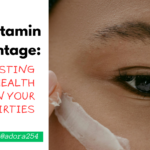Introduction
Collagen has become one of the most talked-about beauty supplements. From powders to capsules, the promise is simple: restore your skin’s youthful glow and bounce. But with so much hype, you may be wondering—do collagen supplements actually improve skin elasticity, or is it all marketing? In this guide, we’ll break down the science, the dosages, the side effects, and natural alternatives so you can make an informed choice.
![Boost Your Bust with Fenugreek: Does It Really Work? [2025 Science Guide]](https://adoral254.com/wp-content/uploads/2025/09/ChatGPT-Image-Sep-8-2025-04_30_17-PM.avif)
What is Collagen and Why Does It Matter for Skin?
Collagen is the most abundant protein in your body, making up about 70% of your skin. It gives skin its structure, firmness, and elasticity. As we age, natural collagen production declines—leading to sagging, dryness, and wrinkles. This decline typically begins in your mid-20s and accelerates after age 30, which is why supplements have become so popular.
What Research Really Says About Collagen Supplements
- Clinical Evidence: A growing number of studies suggest that collagen peptides may improve skin elasticity, hydration, and overall appearance after consistent use (usually 8–12 weeks).
- 2025 Findings: Recent meta-analyses report significant improvements in wrinkle depth and skin smoothness when collagen is combined with supportive nutrients like vitamin C and hyaluronic acid.
- Limitations: Results vary widely, and many studies are funded by supplement companies. Independent research is still limited.
Types of Collagen Supplements and Dosage
- Hydrolyzed Collagen (Collagen Peptides): Most common and easiest to absorb.
- Marine Collagen: Derived from fish, often marketed for beauty.
- Recommended Dosage: 2.5–10 grams daily, with many studies using around 5 grams.
- Best Time to Take It: Can be taken anytime, but consistency matters more than timing.
Side Effects and Safety Considerations
Collagen is generally safe, but some people may experience mild digestive upset or allergic reactions (especially to marine collagen if allergic to fish). Pregnant or breastfeeding women should consult a doctor before use.
Natural Alternatives and Lifestyle Tips
Even if you take collagen, your results depend heavily on your lifestyle. Here’s how to support skin elasticity naturally:
- Vitamin C-rich foods (oranges, bell peppers, kiwi) help your body produce collagen.
- Antioxidants from berries, green tea, and dark chocolate protect collagen from damage.
- Sun protection is critical—UV rays break down collagen faster than aging itself.
- Sleep and hydration support skin renewal.
Conclusion
So, do collagen supplements really work? Yes—but modestly. Research suggests they can improve elasticity and hydration when taken consistently for at least 8 weeks. However, they are not a miracle fix. For best results, combine supplements with a nutrient-rich diet, daily SPF, and good skincare habits.
FAQs
Q1: How long does it take for collagen supplements to improve skin?
Most studies show noticeable results after 8–12 weeks of daily use.
Q2: Is collagen safe to take every day?
Yes, for most healthy adults. Stick to 2.5–10 grams per day and consult your doctor if pregnant or breastfeeding.
Q3: Which foods naturally boost collagen?
Citrus fruits, leafy greens, bone broth, and foods rich in protein and antioxidants help your body produce collagen naturally.
👉 Want more science-based beauty tips? Subscribe to our newsletter at Adoral254.com for weekly updates on natural supplements, skin health, and wellness.




